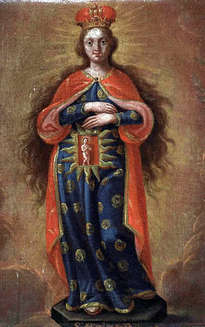
This feast and its octave were very popular in Spain, where the people still call it "Nuestra Señora de la O". It is not known at what time the term Expectatio Partus first appeared; it is not found in the Mozarabic liturgical books. St. Ildephonsus cannot, therefore, have invented it, as some have maintained. The feast was always kept in Spain and was approved for Toledo in 1573 by Gregory XIII as a double major, without an octave. The church of Toledo has the privilege (approved 29 April 1634) of celebrating this feast even when it occurs on the fourth Sunday of Advent. The "Expectatio Partus" spread from Spain to other countries; in 1695 it was granted to Venice and Toulouse, in 1702 to the Cistercians, in 1713 to Tuscany, in 1725 to the Papal States. The Office in the Mozarabic Breviary is exceedingly beautiful; it assigns special antiphons for every day of the octave. At Milan the feast of the Annunciation is, even to the present, kept on the last Sunday before Christmas. The Mozarabic Liturgy also celebrates a feast called the Expectation (or Advent) of St. John the Baptist on the Sunday preceding 24 June.




